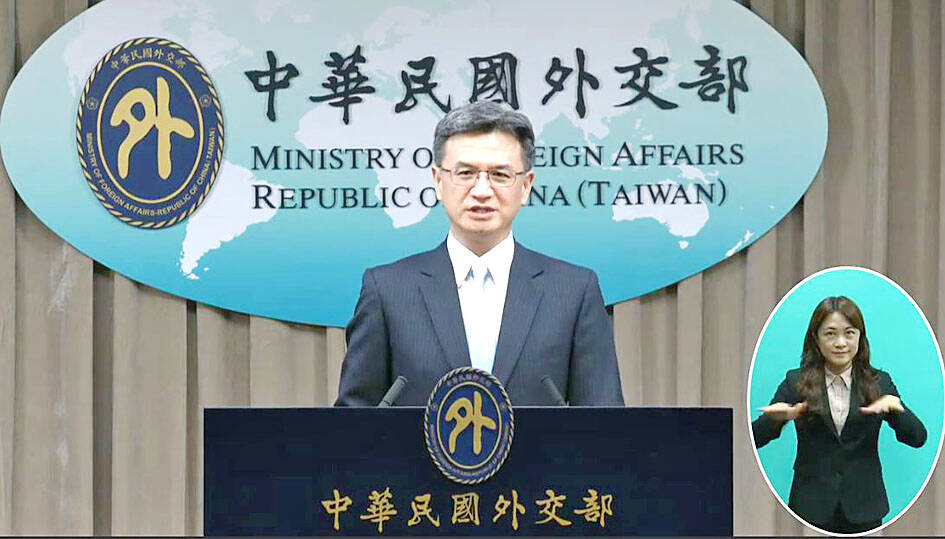The Ministry of Foreign Affairs yesterday vowed to continue deepening ties with Washington after US Secretary of State Antony Blinken reiterated his support for peace and stability in the Taiwan Strait during his trip to China.
“It’s very important that we [the US] preserve the status quo that has helped maintain peace and stability across the Strait for decades,” Blinken said at a news conference at the Beijing American Center on Monday as he wrapped up his two-day visit.
He reiterated that the US’ “one China” policy, guided by the Taiwan Relations Act, the Three Joint Communiques and the “six assurances” has not changed, adding that the US does not support Taiwanese independence.

Photo: screen grab from the ministry’s livestream
The US is concerned about “the PRC’s [People’s Republic of China] provocative actions in the Taiwan Strait, as well as in the South and East China seas,” Blinken said.
A conflict in the Taiwan Strait “would have dramatic consequences for virtually every country around the world” as 50 percent of commercial container traffic goes through the Taiwan Strait and 70 percent of semiconductors are manufactured in Taiwan, he said.
Cross-strait differences should be resolved peacefully, he said, adding that the US remains “committed to meeting our responsibilities under the Taiwan Relations Act, including making sure that Taiwan has the ability to defend itself.”
In Taipei, ministry spokesman Jeff Liu (劉永健) told a news conference that Taiwan and the US trust each other, and the two sides maintain smooth communication channels.
Taiwan has always maintained close contact with the US regarding high-level interactions between the US and China, Liu said.
At a briefing ahead of Blinken’s trip, US National Security Council Coordinator for the Indo-Pacific Kurt Campbell said that many nations and institutions have spoken of their interest in seeing the maintenance of peace and stability across the Taiwan Strait over the past two years, which is “a significant development.”
The statement showed that “the US continues to support peace and stability across the Taiwan Strait with clarity, bipartisanship and unwavering determination,” Liu said.
The ministry welcomed the US’ support for Taiwan, he said, adding that the government would continue deepening its security partnership with the US to defend the rules-based international order, and promote peace, stability and prosperity in the Taiwan Strait and the Indo-Pacific region.
In an interview with National Public Radio at the US embassy in Beijing on Monday, Blinken said that due to responsible management, the US was able to help preserve peace and stability across the Taiwan Strait for more than four decades.
However, the US has “real concerns about the direction that this has taken in recent years where China has taken reckless actions,” he said.
“It’s tremendously important that we [the US and China] communicate clearly, directly, about Taiwan,” Blinken said, adding that he and Chinese officials “had really some very direct, very detailed, very explicit conversations” during his visit.

Conflict with Taiwan could leave China with “massive economic disruption, catastrophic military losses, significant social unrest, and devastating sanctions,” a US think tank said in a report released on Monday. The German Marshall Fund released a report titled If China Attacks Taiwan: The Consequences for China of “Minor Conflict” and “Major War” Scenarios. The report details the “massive” economic, military, social and international costs to China in the event of a minor conflict or major war with Taiwan, estimating that the Chinese People’s Liberation Army (PLA) could sustain losses of more than half of its active-duty ground forces, including 100,000 troops. Understanding Chinese

The Ministry of Foreign Affairs (MOFA) yesterday said it is closely monitoring developments in Venezuela, and would continue to cooperate with democratic allies and work together for regional and global security, stability, and prosperity. The remarks came after the US on Saturday launched a series of airstrikes in Venezuela and kidnapped Venezuelan President Nicolas Maduro, who was later flown to New York along with his wife. The pair face US charges related to drug trafficking and alleged cooperation with gangs designated as terrorist organizations. Maduro has denied the allegations. The ministry said that it is closely monitoring the political and economic situation

‘SLICING METHOD’: In the event of a blockade, the China Coast Guard would intercept Taiwanese ships while its navy would seek to deter foreign intervention China’s military drills around Taiwan this week signaled potential strategies to cut the nation off from energy supplies and foreign military assistance, a US think tank report said. The Chinese People’s Liberation Army (PLA) conducted what it called “Justice Mission 2025” exercises from Monday to Tuesday in five maritime zones and airspace around Taiwan, calling them a warning to “Taiwanese independence” forces. In a report released on Wednesday, the Institute for the Study of War said the exercises effectively simulated blocking shipping routes to major port cities, including Kaohsiung, Keelung and Hualien. Taiwan would be highly vulnerable under such a blockade, because it

UNRELENTING: China attempted cyberattacks on Taiwan’s critical infrastructure 2.63 million times per day last year, up from 1.23 million in 2023, the NSB said China’s cyberarmy has long engaged in cyberattacks against Taiwan’s critical infrastructure, employing diverse and evolving tactics, the National Security Bureau (NSB) said yesterday, adding that cyberattacks on critical energy infrastructure last year increased 10-fold compared with the previous year. The NSB yesterday released a report titled Analysis on China’s Cyber Threats to Taiwan’s Critical Infrastructure in 2025, outlining the number of cyberattacks, major tactics and hacker groups. Taiwan’s national intelligence community identified a large number of cybersecurity incidents last year, the bureau said in a statement. China’s cyberarmy last year launched an average of 2.63 million intrusion attempts per day targeting Taiwan’s critical